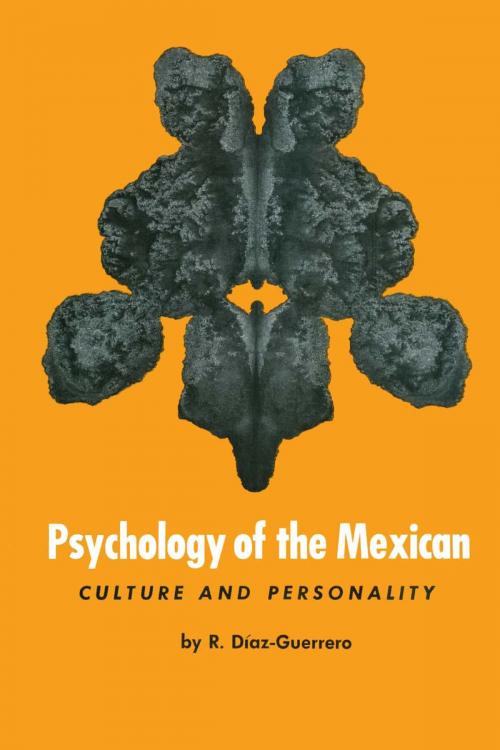| Author: | R. Díaz-Guerrero | ISBN: | 9780292772731 |
| Publisher: | University of Texas Press | Publication: | July 3, 2014 |
| Imprint: | University of Texas Press | Language: | English |
| Author: | R. Díaz-Guerrero |
| ISBN: | 9780292772731 |
| Publisher: | University of Texas Press |
| Publication: | July 3, 2014 |
| Imprint: | University of Texas Press |
| Language: | English |
In his quest to understand and describe the behavior of the Mexican, the distinguished Mexican psychologist R. Díaz-Guerrero combines a strong theoretical interest in the relationship of culture to personality with a pragmatic concern for methodology. This collection of essays is rooted both in studies of Mexican psychology as an independent phenomenon and in cross-cultural comparisons of Mexicans, Mexican-Americans, and Anglo-Americans. Dr. Díaz-Guerrero discusses Mexican attitudes toward sex roles and the family, motivations of the Mexican worker, and other topics. He compares Mexican and American concepts of respect and analyzes the relation between neurosis and the Mexican family structure. He attempts to determine the degree of mental, personal, and social health of urban Mexicans. The importance of basic sociocultural premises, such as "The mother is the dearest person in existence," and "The stricter the parents are, the better the children turn out," is explored. In one essay, Díaz-Guerrero notes the differences in typical reactions to stress in Mexico and the United States, concluding that the American pattern involves active response to stress, whereas the Mexican response tends to be more passive. Psychology of the Mexican deals with a variety of historical, psychological, biological, social, economic, and anthropological variables, attempting to treat them in a scientific way through the use of carefully constructed questionnaires, with detailed statistical analyses of the results. On the basis of data obtained in this way, the author formulates broad conceptual schemes with immediate application to the understanding of human behavior in real situations. He is particularly intrigued by the way the individual relates to the significant people in his environment. For the Mexican, he says, such interpersonal relationships are the most important part of life; in contrast to the American insistence on liberty and equality, Mexican culture emphasizes affiliation and love.
In his quest to understand and describe the behavior of the Mexican, the distinguished Mexican psychologist R. Díaz-Guerrero combines a strong theoretical interest in the relationship of culture to personality with a pragmatic concern for methodology. This collection of essays is rooted both in studies of Mexican psychology as an independent phenomenon and in cross-cultural comparisons of Mexicans, Mexican-Americans, and Anglo-Americans. Dr. Díaz-Guerrero discusses Mexican attitudes toward sex roles and the family, motivations of the Mexican worker, and other topics. He compares Mexican and American concepts of respect and analyzes the relation between neurosis and the Mexican family structure. He attempts to determine the degree of mental, personal, and social health of urban Mexicans. The importance of basic sociocultural premises, such as "The mother is the dearest person in existence," and "The stricter the parents are, the better the children turn out," is explored. In one essay, Díaz-Guerrero notes the differences in typical reactions to stress in Mexico and the United States, concluding that the American pattern involves active response to stress, whereas the Mexican response tends to be more passive. Psychology of the Mexican deals with a variety of historical, psychological, biological, social, economic, and anthropological variables, attempting to treat them in a scientific way through the use of carefully constructed questionnaires, with detailed statistical analyses of the results. On the basis of data obtained in this way, the author formulates broad conceptual schemes with immediate application to the understanding of human behavior in real situations. He is particularly intrigued by the way the individual relates to the significant people in his environment. For the Mexican, he says, such interpersonal relationships are the most important part of life; in contrast to the American insistence on liberty and equality, Mexican culture emphasizes affiliation and love.















